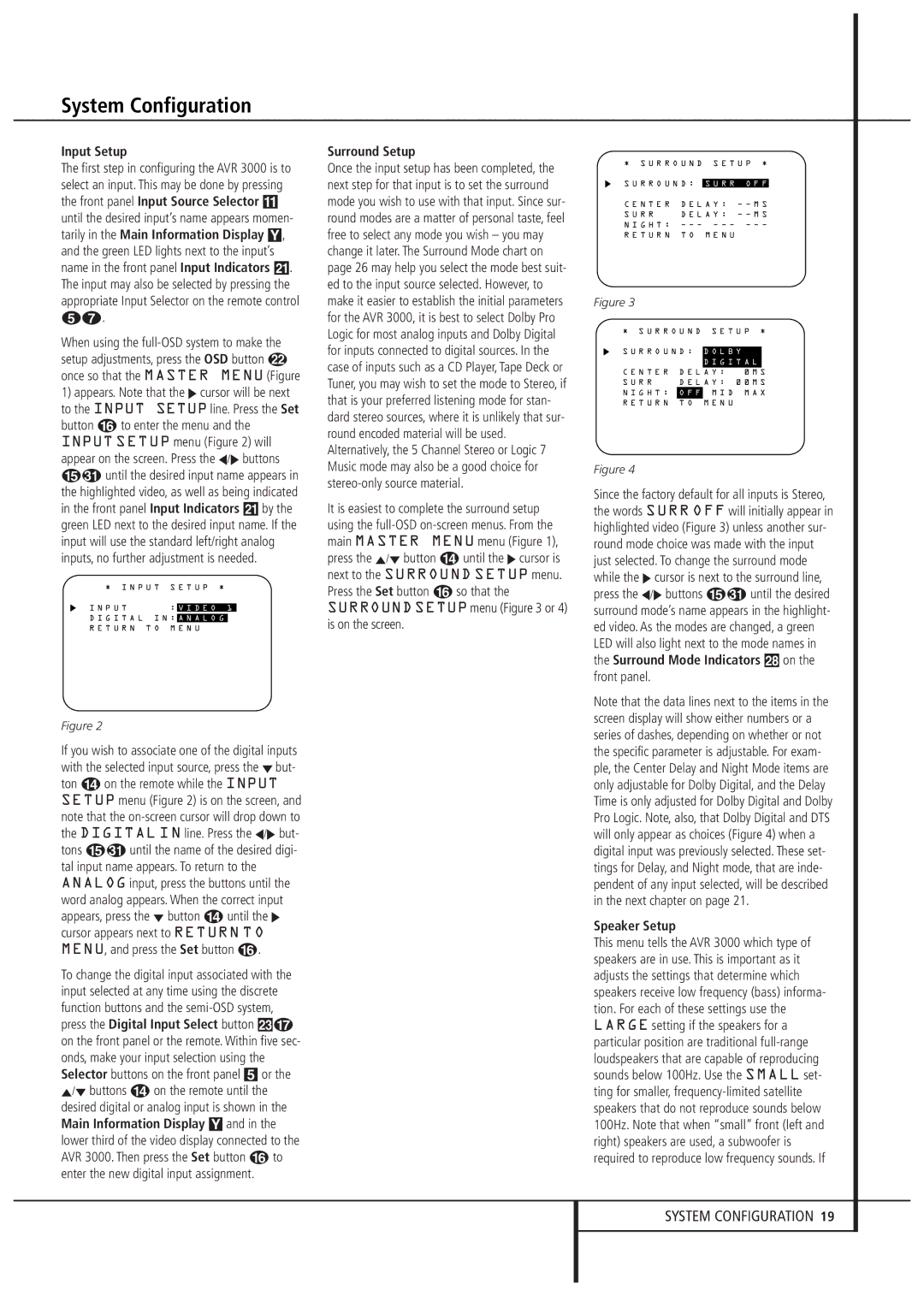
System Configuration
Input Setup
The first step in configuring the AVR 3000 is to select an input. This may be done by pressing the front panel Input Source Selector ! until the desired input’s name appears momen- tarily in the Main Information Display Y, and the green LED lights next to the input’s name in the front panel Input Indicators Ô. The input may also be selected by pressing the appropriate Input Selector on the remote control 46.
When using the
Euntil the desired input name appears in the highlighted video, as well as being indicated in the front panel Input Indicators Ôby the green LED next to the desired input name. If the input will use the standard left/right analog inputs, no further adjustment is needed.
* I N P U T | S E T U P * | ||
|
|
| |
I N P U T | : | V I D E O 1 | |
| |||
D I G I T A L I N : | A N A L O G |
| |
R E T U R N T O | M E N U | ||
Surround Setup
Once the input setup has been completed, the next step for that input is to set the surround mode you wish to use with that input. Since sur- round modes are a matter of personal taste, feel free to select any mode you wish – you may change it later. The Surround Mode chart on page 26 may help you select the mode best suit- ed to the input source selected. However, to make it easier to establish the initial parameters for the AVR 3000, it is best to select Dolby Pro Logic for most analog inputs and Dolby Digital for inputs connected to digital sources. In the case of inputs such as a CD Player, Tape Deck or Tuner, you may wish to set the mode to Stereo, if that is your preferred listening mode for stan- dard stereo sources, where it is unlikely that sur- round encoded material will be used. Alternatively, the 5 Channel Stereo or Logic 7 Music mode may also be a good choice for
It is easiest to complete the surround setup using the
* S U R R O U N D S E T U P *
S U R R O U N D : S U R R O F F
C E N T E R D E L A Y :
S U R R D E L A Y :
N I G H T :
R E T U R N T O M E N U
Figure 3
* S U R R O U N D | S E T U P * | |||
|
|
|
| |
S U R R O U N D : | D O L B Y |
|
| |
|
| D I G I T A L |
| |
C E N T E R D E L A Y : | 0 M S | |||
S U R R | D E L A Y : 0 0 M S | |||
N I G H T : | O F F | M I D M A X | ||
R E T U R N T O | M E N U |
|
| |
|
|
|
|
|
Figure 4
Since the factory default for all inputs is Stereo, the words SURR OFF will initially appear in highlighted video (Figure 3) unless another sur- round mode choice was made with the input just selected. To change the surround mode while the › cursor is next to the surround line, press the ‹/› buttons E until the desired surround mode’s name appears in the highlight- ed video. As the modes are changed, a green LED will also light next to the mode names in the Surround Mode Indicators ˆon the front panel.
Figure 2
If you wish to associate one of the digital inputs with the selected input source, press the ¤ but- ton Don the remote while the INPUT SETUP menu (Figure 2) is on the screen, and note that the
To change the digital input associated with the input selected at any time using the discrete function buttons and the
Note that the data lines next to the items in the screen display will show either numbers or a series of dashes, depending on whether or not the specific parameter is adjustable. For exam- ple, the Center Delay and Night Mode items are only adjustable for Dolby Digital, and the Delay Time is only adjusted for Dolby Digital and Dolby Pro Logic. Note, also, that Dolby Digital and DTS will only appear as choices (Figure 4) when a digital input was previously selected. These set- tings for Delay, and Night mode, that are inde- pendent of any input selected, will be described in the next chapter on page 21.
Speaker Setup
This menu tells the AVR 3000 which type of speakers are in use. This is important as it adjusts the settings that determine which speakers receive low frequency (bass) informa- tion. For each of these settings use the LARGE setting if the speakers for a particular position are traditional
SYSTEM CONFIGURATION 19
